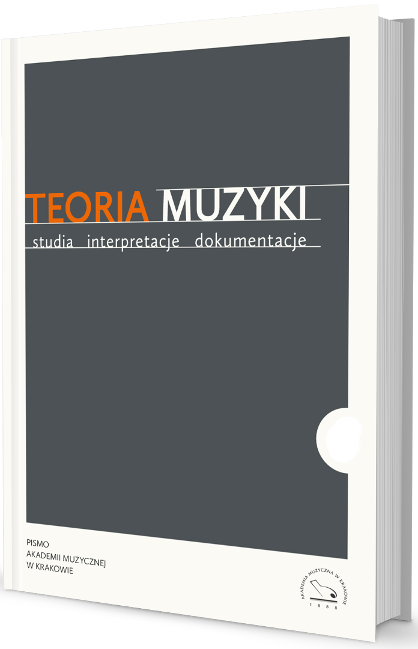Tonalność a wartość muzyki w kontekście idei autonomii sztuki i modernizmu
Tonality and the Significance of Music within the Context
of the Idea of the Autonomy of Arts and Modernism
Author(s): Marcin StrzeleckiSubject(s): Music
Published by: Akademia Muzyczna w Krakowie im. Krzysztofa Pendereckiego
Keywords: tonality; discourse of values; musical modernism; autonomy of art; artistic freedom; critical theory
Summary/Abstract: One might think that in recent years the theme of tonality in music has been the subject of such vast and deep research that it should now be deemed finished and closed. Tonality has been placed within the scope of the humanities, within empirical and formal studies; from psychoacoustics, cognitive and computer studies, through evolutional aesthetics, neurology and psychology, semiotics and narratology, to anthropology and social sciences, various branches of philosophy, aesthetics, phenomenology and hermeneutics – and those are just the most crucial disciplines. And yet the topic has not been fully exhausted. Now and again discussions around it bloom, especially around the formation of axiological criteria when the so called “artistic value” is at stake. Prior to Schönberg and his contemporaries, i.e. composers experimenting with other than tonal ways of pitch organisation, tonality itself used to be a phenomenon axiologically neutral, even transparent, due to its universality and obviousness. It is since the emergence of the twelve-tone and serialist techniques that tonality has been used in relation with the “artistic value”. In its culmination point, i.e. the so called “Second Avant-Garde od the 20 th Century”, a lack of tonal references becomes a crucial requirement (though – hopefully – not a precondition) for the presence of artistic value. In other words: from some perspectives (which shall be further elaborated on), tonality – the persona non grata of “artistic” music, disqualifies a work, it seems to be a clear criterion of distinguishing between kitsch or a piece of popular culture and a true artistic work or a sound structure eligible to be considered as one.
Journal: Teoria Muzyki. Studia, Interpretacje, Dokumentacje
- Issue Year: VII/2018
- Issue No: 12
- Page Range: 45-103
- Page Count: 59
- Language: Polish

